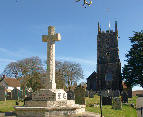Henry Parker was born in 1895, the 5th son and 9th child of John, an agricultural worker, and Emma (formally Mitchell), living at Lute House, Winkleigh. The Parker family at that time was probably the largest in the village; no less than 17 children were born to John and Emma. The Parker family tree is on this page, as is a photograph of the whole family taken about 1912. No family in Winkleigh contributed more to the war effort than the Parkers of Lute House. Five sons served in the army, 4 returning safely, while Sidney (whose name is preserved on the Memorial Cross and whose story is written on the site) was killed at Passchendaele on 26th October 1917 leaving a young wife and baby daughter. Together with the records of three of the brothers (Samuel, Frederick and Sidney) Henry’s military documents were destroyed with so many others in the London blitz. Only those relating to Eli survived, to enable us to trace his army career, which was spent in India. Meanwhile, Henry’s medal card gives us the basics of his service.
Henry is recorded in the Chumleigh Deanery Magazine for November 1914 as enlisting in the 6th Devons Territorials, finding himself before the year had ended stationed in India - part of the 130th Brigade, 43rd Wessex Division which went there intact, less only the Brigades staff, the Field Artillery Ammunition Columns, the Royal Engineers and the Royal Army Medical Corps, all of which were made up from units in India itself. The full story of the 6th Devons in India 1914-1915, and from 1916 in Mesopotamia, can be read in the account of Thomas Knight, whose name appears on the Memorial Cross, killed at the battle of Dujailah on 8th March 1916. The subsequent history of the 6th Devons in Mesopotamia can be seen in the attached document to this account, ‘1st/6th Devon Regiment 1914-18’. Other relevant documents on the web-site include ‘How Turkey entered the War’, a map of the battle of Kut-el-Amara and the transcript of a pamphlet ‘Dujailah Days’ which can be found on the memorial site to Thomas Knight.
Henry’s medal card carries two numbers, the first his enlistment number before the war in the 6th Devons, the second his new number following the re-numbering of all Territorial men which came into effect on 1st March 1917. All the 6th Territorial battalions of the various regiments were given new numbers between 265001 and 290000. Henry remained with the battalion until the end of the war. Although the 6th Devons served overseas immediately, India was not regarded as qualifying from the Mons Star , awarded to all those who served in France and Flanders1914-1915. This was a severe disappointment to the battalion, who had been consoled, with a special message from the King prior to embarkation, that their service in India would be regarded with equal importance to those going to France. As a result, many of the veterans were awarded instead with the Territorial Forces War Medal, to add to the British and Victory War Medals.
In 1928 Henry Parker was married to the young Hilda Passmore, aged 19, daughter of the road contractor living in Hollocombe. During the Second World War Henry served in the Winkleigh platoon of the 6th Devons Home Guard. There are two photos of Henry: a family gathering in about 1910 shows Henry on the extreme right, back row, and in a 1942 photo of the Home Guard Henry is seated at the extreme right hand of the row. He was a well-known personality in the village and his memory is preserved to this day.
